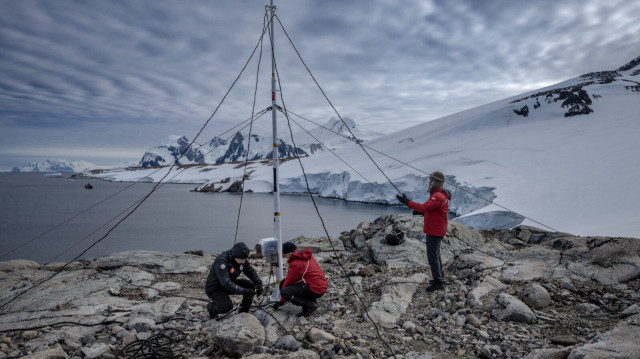
Expedition includes joint research with scientists from Argentina, Bulgaria, and Ecuador, highlighting Türkiye's strong science diplomacy, says Turkish technology minister
Türkiye's fifth National Arctic Scientific Research Expedition has officially begun, with 12 scientists conducting 19 projects in the Arctic Ocean as part of the country's growing polar research efforts.
The expedition is being carried out under the auspices of the Turkish Presidency and led by the Industry and Technology Ministry in coordination with the Scientific and Technological Research Council of Türkiye (TUBITAK) MAM Polar Research Institute.
The research team departed from Istanbul and traveled through Oslo and Tromso before reaching Longyearbyen in Svalbard, at 78 degrees north latitude, where scientific activities are now underway.
In a post on X, Industry and Technology Minister Mehmet Fatih Kacir announced the launch of the expedition, following the successful completion of Türkiye's ninth National Antarctic Science Expedition earlier this year.
He said the scientific team will collect seawater and sediment samples, examine microplastics on the ocean surface, and track atmospheric dynamics using GNSS and meteorological systems. “The traces of climate change will be tracked in the polar regions,” Kacir said.
He also highlighted the participation of three high school students, winners of Türkiye's TEKNOFEST technology competition, who will test their projects under Arctic conditions and contribute to the expedition's scientific efforts.
The mission includes joint projects with researchers from Argentina, Bulgaria, and Ecuador, which Kacir described as a strong example of Türkiye's commitment to science diplomacy.
He said the country, under President Recep Tayyip Erdogan's leadership, will continue expanding its polar presence through science-driven initiatives.
- Arctic mission focuses on climate, marine ecosystems, and long-term monitoring
Prof. Burcu Ozsoy, coordinator of the expedition, said the mission will be based entirely in the Arctic, unlike previous research missions to Antarctica.
“We plan to start and end our expedition in Svalbard and to carry out research in the Arctic Ocean throughout the mission,” she said.
The projects cover a wide range of scientific areas, including atmospheric measurements, marine water and sediment sampling, and studies of Arctic ecosystems.
She noted that many of the observations will contribute to long-term monitoring using ground-based data and satellite imagery to track the effects of climate change.
- High school students contribute to polar science
Asli Kilci, an 11th-grade student at Dumlupinar Science and Art Center in Afyonkarahisar, joined the expedition after winning first place in TUBITAK's 2204-C competition for her project on 19th-century polar exploration illustrations.
“I analyzed these illustrations using symbolic analysis methods and created a digital comic book for middle school students, aiming to raise awareness,” Kilci said. “Just as early explorers illustrated the poles through their own eyes, I now hope to depict the Arctic through mine.”
Kaan Yusuf Odaci, from Ozlem Burma Vocational and Technical Anatolian High School in Kastamonu, was selected for his mobile device that uses artificial intelligence to measure air quality. He won first place in the 2204-D competition.
Elif Berra Demir, an 11th-grade student from TUBITAK Science High School in Gebze, Kocaeli, also joined the expedition after winning in the sustainability and welfare category of the same competition.
The expedition is aligned with Türkiye's “National Polar Science Strategy,” focusing on national and international scientific priorities and strategically important research themes.







